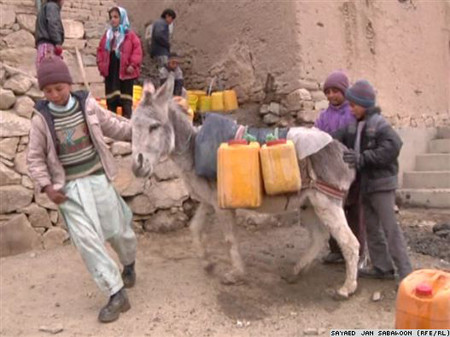By Zarif Nazar, Charles Recknagel
KABUL - Early each morning, the schoolchildren of the Aqibi Silo neighborhood emerge from their homes on a hillside near the center of Kabul.

After the canisters have been filled, children use donkeys to carry the water back uphill.
But they don't go to class. Instead, they go off to fetch water -- over and over again -- until long after the school day is done.
They begin by tumbling down the narrow footpaths carrying brightly colored plastic canisters as light as balloons. The banging of the empty cans lends the scene a playful air, until they reach a tap at the base of the hill, where water flows two hours every other day.
The kids fill the canisters with water until they are as heavy as grain sacks. Then, loading the canisters on a donkey, or carrying lighter loads on their heads, they climb back up the hill in the first of many trips.
By the time school has let out elsewhere in Kabul, the children will have ferried enough water uphill to compensate for the municipal pipes that don't deliver water to their hillside homes. To find water tomorrow, they will have to go still farther afield, because the tap at the base of their hill will be off.
The water carriers of Aqibi Silo are hardly the only child laborers in Kabul. But the fact that they are missing school to deliver water that should be delivered by public utilities outrages the people of their neighborhood.
But calling on the government for action is easier in Kabul than getting results. As individuals with complaints quickly learn, there are myriad agencies responsible for public services in Kabul. Worse, there is little coordination between them and little public information about which does what.
'We Face Difficulties'
"Liberty Listeners," a gadfly program produced by RFE/RL's Radio Free Afghanistan, is aimed at getting officials to address citizens' complaints. The show experienced the maze of bureaucracy firsthand when it sought to relay listeners' concerns about the water carriers to city officials. A phone call to the mayor's office revealed the scope of the problem.
Mayor Yunus Nawandish said a new office had recently been created to manage the distribution of water in Kabul. But he said the office was not under the mayor's jurisdiction.
"Unfortunately, some responsibilities such as water distribution and canalization, which should be actually under the jurisdiction of the mayor of Kabul, are not under the jurisdiction of the mayor of Kabul," he said. "Therefore, we face difficulties. But we are hopeful that this issue will be solved in the future."
Even the mayor was uncertain of the new office's name and location. He did promise, however, to try to independently solve the hillside neighborhood's water shortage.
Children Become Lifeline
A lack of coordination is endemic among Afghan government offices, where officials compete to set up new bureaus to enlarge their patronage systems. But the results are particularly noticeable in Kabul because the population and need for services has swollen with hundreds of thousands of returning refugees since 2001.
The hardscrabble slopes around Kabul pose a particular problem. They are attractive to poor people looking for space to build a home but providing water to them requires pipes with sufficient pressure to flow uphill. During the past 10 to 15 years, the pipes that once did that have fallen into disrepair and now work only occasionally or not at all.
For families with children, the children become the lifeline. And as they do, the children of the poorest families also become the water suppliers to those with no children of their own.
One resident, Zauddin, says he is in too frail health to carry water up to his home himself. So, he buys water from children who deliver the heavy canisters to his door. But he says the water is not clean or healthy and has to be boiled before use.
The children of impoverished families who make a business of selling water earn just a pittance for their labors.
One, Mirwais, tells Radio Free Afghanistan that he earns just 10 Afghanis a bucket, about the price of a piece of bread. But he says the money is needed by his family, so he continues working.
"We have nobody at home who earns money. Everything is very expensive -- rice, wood for heating," he says. "Because of that, I left school and I'm working with my donkey."
The cost for Mirwais himself is high. He has already missed so much time at school that he has given up any ideas of returning. And he has already suffered his first serious injury as he begins what is likely to be a lifetime of hard manual labor.
The accident happened as he and his companions ventured far from their neighborhood to bring water from a cistern near Kabul University. As they moved along a crowded road, a passing car sideswiped their heavily burdened donkey, knocking it off its feet and onto Mirwais.
The boy broke his arm and temporarily had to stop working. But he is back leading his donkey up the steep paths to his neighborhood, as unable to take time off to rest as he is to take time off for school.
Radio Free Afghanistan's Sayaed Jan Sabawoon contributed to this report



